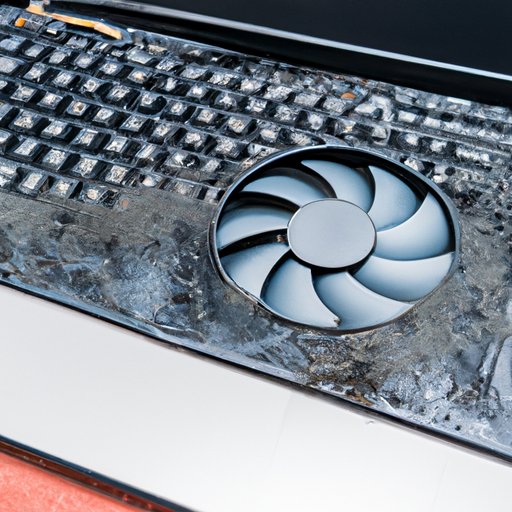Introduction
If you’ve ever owned a laptop, you’ve likely experienced the frustration of it getting uncomfortably hot. Overheating laptops can be inconvenient and even dangerous, as they can cause serious damage to your system. This article will explore why laptops overheat and provide tips on how to reduce heat output and keep your laptop running cool.

Analyzing the Components of Your Laptop and How They Generate Heat
In order to understand why laptops get so hot, it’s important to first identify the main sources of heat in a laptop. The main source of heat is the CPU (central processing unit), which is responsible for the majority of the work that your computer does. Other components such as the hard drive, graphics card, and RAM also generate heat.
When these components are working hard, they produce a lot of heat. To keep your laptop from overheating, the internal fans draw air from outside the laptop and blow it over the components to keep them cool. However, if the laptop’s vents become blocked or the fan stops working, the heat can build up quickly and cause your laptop to overheat.
Exploring Reasons for Overheating, Including Poor Ventilation and Overclocking
One of the most common causes of laptop overheating is poor ventilation. If the vents on your laptop are blocked by dust or other debris, then the air flow is restricted and the heat can’t escape, causing your laptop to overheat. Additionally, if you’re using your laptop on a soft surface such as a bed or couch, this can also restrict air flow and cause your laptop to overheat.
Another potential cause of overheating is overclocking, which is when you push your laptop’s processor to run at a higher speed than it was designed for. This can increase the amount of heat generated, which can lead to your laptop overheating.

The Benefits of Using a Cooling Pad or External Fan to Reduce Heat
Using a cooling pad or external fan is one way to help keep your laptop cool. A cooling pad is a device that sits underneath your laptop and helps to dissipate heat. It typically has fans built-in that draw air away from the laptop to help keep it cool. Some cooling pads even have adjustable height settings, so you can customize the angle of your laptop for optimal cooling.
An external fan is another option for cooling your laptop. These devices can be placed near your laptop to pull hot air away from the system and help keep it cool. While external fans can be helpful, they don’t always provide the same level of cooling as a cooling pad.
Troubleshooting Tips for Fixing an Overheating Laptop
If your laptop is overheating, there are several steps you can take to try to fix the issue. First, make sure that the vents on your laptop are not blocked. If they are, use a can of compressed air to blow out any dust or debris that may be blocking the airflow. Additionally, check your laptop’s fan to make sure that it’s still spinning. If it isn’t, then you may need to replace it.
If your laptop is still overheating after cleaning the vents and checking the fan, then you may need to update your laptop’s software. Outdated drivers and software can cause your laptop to run inefficiently and generate more heat than necessary. Updating your software can help reduce the amount of heat being generated by your laptop.

Examining the Impact of Dust and Debris on System Heat Output
Dust and debris can also be a major contributor to laptop overheating. Over time, dust and debris can accumulate inside your laptop and block the vents, restricting air flow and causing your laptop to overheat. To prevent this from happening, it’s important to regularly clean the inside of your laptop.
To clean the inside of your laptop, turn it off and unplug it. Then, use a soft brush or vacuum to remove any dust or debris that may be blocking the vents. Additionally, use a can of compressed air to blow out any remaining dust or debris. Once you’ve finished cleaning, make sure to plug your laptop back in and turn it on.
Investigating Software Updates and Upgrades That Can Help Keep Your Laptop Cool
Software updates and upgrades can also help keep your laptop cool. Outdated software can cause your laptop to run inefficiently and generate more heat than necessary. By updating your software to the latest version, you can help ensure that your laptop is running optimally and generating less heat.
In addition to updating your software, you may also want to consider upgrading some of your laptop’s hardware components. For example, if your laptop has an older model CPU, you may want to consider upgrading it to a newer model. Newer CPUs are typically more efficient and generate less heat than their older counterparts.
Conclusion
Laptops can get very hot and cause serious damage to your system if left unchecked. In this article, we explored why laptops overheat and discussed some potential solutions, including using a cooling pad or external fan, updating your software, and cleaning the inside of your laptop. We also outlined some troubleshooting tips for fixing an overheating laptop. If you’re still having issues with your laptop overheating, reach out to a professional for further assistance.


